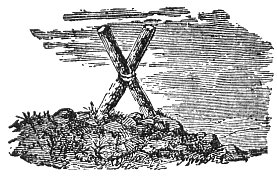p. 561
The essence of the ψυχικοὶ [psuchikoi] is disruption into multiplicity, manifoldness; which, however, is subordinate to a higher unity, by which it allows itself to be guided, first unconsciously, then consciously.
The essence of the ὑλικοὶ [Hulikoi] (of whom Satan is the head), is the direct opposite to all unity; disruption and disunion in itself, without the least sympathy, without any point of coalescence whatever for unity; together with an effort to destroy all unity, to extend its own inherent disunion to everything, and to rend everything asunder. This principle has no power to posit anything; but only to negative: it is unable to create, to produce, to form, but only to destroy, to decompose.
By Marcus, the disciple of Valentinus, the idea of a Λογος του οντος [Logos Tou Ontos], of a WORD, manifesting the hidden Divine Essence, in the Creation, was spun out into the most subtle details–the entire creation being, in his view, a continuous utterance of the Ineffable. The way in which the germs of divine life [the σπέρματα πνευματικὰ . . spermata pneumatika], which lie shut up in the Eons, continually unfold and individualize themselves more and more, is represented as a spontaneous analysis of the several names of the Ineffable, into their several sounds. An echo of the Ple_roma falls down into the ὕλη [Hule_], and becomes the forming of a new but lower creation.
One formula of the pneumatical baptism among the Gnostics ran thus: “In the NAME which is hidden from all the Divinities and Powers” [of the Demiurge], “The Name of Truth” [the Αλήθεια [Aletheia], self-manifestation of the Buthos], which Jesus of Nazareth has put on in the light-zones of Christ, the living Christ, through the Holy Ghost, for the redemption of the angels,–the Name by which all things attain to Perfection.” The candidate then said: “I am established and redeemed; I am redeemed in my soul from this world, and from all that belongs to it, by the name of ו ?Y?H?W?H, who has redeemed the Soul of Jesus by the living Christ.” The assembly then said: “Peace (or Salvation) to all on whom this name rests!”
The boy Dionusos, torn in pieces, according to the Bacchic Mysteries, by the Titans, was considered by the Manicheans as simply representing the Soul, swallowed up by the powers of darkness,–the
p. 562
divine life rent into fragments by matter:–that part of the luminous essence of the primitive man [the πρῶτος ἄνθρωπος [Protos Anthropos] of Mani, the πράων ἄνθρωπος [Prao_n Anthro_pos] of the Valentinians, the Adam Kadmon of the Kabalah; and the Kaiomorts of the Zendavesta], swallowed up by the powers of darkness; the Mundane Soul, mixed with matter–the seed of divine life, which had fallen into matter, and had thence to undergo a process of purification and development.
The Γνῶσις [Gnosis] of Carpocrates and his son Epiphanes consisted in the knowledge of one Supreme Original being, the highest unity, from whom all existence has emanated, and to whom it strives to return. The finite spirits that rule over the several portions of the Earth, seek to counteract this universal tendency to unity; and from their influence, their laws, and arrangements, proceeds all that checks, disturbs, or limits the original communion, which is the basis of nature, as the outward manifestation of that highest Unity. These spirits, moreover, seek to retain under their dominion the souls which, emanating from the highest Unity, and still partaking of its nature, have lapsed into the corporeal world, and have there been imprisoned in bodies, in order, under their dominion, to be kept within the cycle of migration. From these finite spirits, the popular religions of different nations derive their origin. But the souls which, from a reminiscence of their former condition, soar upward to the contemplation of that higher Unity, reach to such perfect freedom and repose, as nothing afterward can disturb or limit, and rise superior to the popular deities and religions. As examples of this sort, they named Pythagoras, Plato, Aristotle, and Christ. They made no distinction between the latter and the wise and good men of every nation. They taught that any other soul which could soar to the same height of contemplation, might be regarded as equal with Him.

Moe is the founder of GnosticWarrior.com. He is a father, husband, author, martial arts black belt, and an expert in Gnosticism, the occult, and esotericism.





